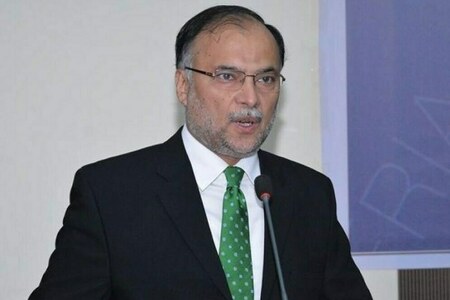Call for Enhanced Regional Connectivity and Economic Collaboration
Federal Minister for Planning, Development, and Special Initiatives, Professor Ahsan Iqbal, has highlighted the imperative of strengthened regional connections and amplified economic synergy between South and Central Asia.
Professor Iqbal voiced these sentiments while addressing a distinguished assembly of diplomats, subject matter experts, and development collaborators at the inaugural event for a significant research paper. This report delves into the practicality of establishing an East-West Economic Corridor linking South and Central Asia.
The event was honored by the presence of Kazakhstan’s Ambassador, Yerzhan Kistafin, amongst other prominent figures, signifying a crucial juncture in the pursuit of heightened economic cooperation within the region.
The report, a collaborative effort by RAND Corporation, supported by the Junaid Family Foundation and the RAND Center for Asia Pacific Policy Advisory Board, delivers essential perspectives on the possibilities of a trans-regional economic pathway amidst substantial shifts in the global economic landscape.
Iqbal remarked on the longstanding historical bonds of civilization, culture, and commerce shared by South and Central Asia. He observed that despite increased rigidity in political borders, the fundamental principles of economic geography endure. He underscored the pressing requirement for regional integration, particularly for landlocked Central Asian nations seeking avenues to access global markets—an ambition Pakistan is well-equipped to facilitate via its Gwadar and Karachi ports.
Emphasizing Pakistan’s pivotal position at the intersection of South Asia, China, and Central Asia, the minister stated, “Our nation is centrally located within a region of 3 billion inhabitants, presenting immense prospects for trade and economic activities.” He asserted that regional connectivity transcends a mere slogan, representing a strategic necessity within Pakistan’s national development blueprint.
Alluding to the government’s 5Es Framework, with substantial emphasis on Energy and Infrastructure, he elaborated on Pakistan’s proactive stance in promoting multimodal regional connectivity, coupled with continuous investments in rail, road, and port infrastructure.
“We are vigorously pursuing the operationalization of CPEC 2.0 and Central Asia Regional Economic Cooperation (CAREC) corridors, directed westward through Pakistan towards Central Asia,” he added.
Iqbal delineated Pakistan’s concrete measures, including:
- Upgrading Gwadar Port
- Expanding the ML-1 railway
- Digitising customs procedures and border crossings
- Developing Special Economic Zones (SEZs)
- Boosting power transmission capabilities
He validated that these initiatives are underpinned by considerable allocations under the Public Sector Development Programme (PSDP), with the majority of funds earmarked for infrastructure, logistics, and energy sectors.
“Our dedication is manifested through ongoing projects aimed at rendering connectivity both viable and functional,” he affirmed.
The planning minister stressed that connectivity cannot flourish amidst coercion, occupation, or hegemonic aspirations, emphasizing that regional tranquility constitutes the primary prerequisite for regional commerce.
“The concept of an East-West Economic Corridor linking Central Asia, Afghanistan, Iran, Pakistan, and India is not novel, yet it must transition from aspiration to actionable policy, bolstered by political resolve and mutual trust,” he conveyed.
Concluding his address, Minister Iqbal reaffirmed Pakistan’s steadfast commitment to a foreign policy rooted in geo-economics, stating: “Pakistan advocates peaceful coexistence, regional integration, and mutually advantageous cooperation. Our national development paradigm, Uraan Pakistan, situates connectivity, trade, and sustainable expansion at the core of our strategy.”
He recognized the vast potential of regional corridors, notably a land-based East-West corridor, to unleash economic prosperity and facilitate access to global markets for all participating nations.



Comments (0)
No comments yet. Be the first to comment!
Leave a Comment